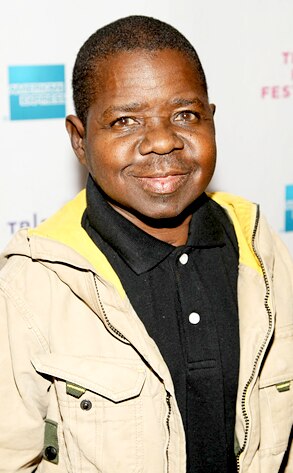Gary Coleman, 42 , the diminutive, wisecracking child star of the sitcom “Diff’rent Strokes,” whose adult life collapsed into a tabloid calamity, died Friday at a Utah hospital from a brain hemorrhage.

His brother-in-law told the celebrity gossip site TMZ.com that Mr. Coleman had fallen and injured his head at the actor’s home in Santaquin, Utah.
Mr. Coleman was 10 when he stepped into the national spotlight in 1978, playing the witty, lovable Arnold Jackson on NBC’s “Diff’rent Strokes.” The role was written for him and made Mr. Coleman the best-known child star on television for the eight years the hit comedy was on the air.
He played one of two orphaned African American brothers adopted by a white Manhattan millionaire after their mother — the rich man’s maid — had died. The show became a comedic showcase for Mr. Coleman, who looked younger than his actual age because his growth had been stunted by a congenital kidney condition.
On the set, he proved to be a thorough professional who could memorize his dialogue in a single reading and deliver it with perfect timing. His signature line, directed toward his brother Willis, played by Todd Bridges, became a nationwide catch phrase: “What’chu talkin’ ’bout, Willis?”
“The true star of the show is 10-year old Gary Coleman as 8-year-old Arnold,” The Washington Post’s Tom Shales wrote when the show premiered, calling Mr. Coleman “a most unusual tot with a strikingly professional comic delivery.”
Newsweek pronounced him “NBC’s Littlest Big Man” and “possibly the most original vid-kid since Howdy Doody.”
First lady Nancy Reagan appeared on “Diff’rent Strokes” in 1983 to make an anti-drug pitch, and Mr. Coleman had his own Saturday morning cartoon show. As a guest on “The Tonight Show,” Mr. Coleman managed to upstage Johnny Carson, who jokingly asked if he wanted to take over the rest of the show.
“With all the laughing and cheering out there,” he replied, “quite possibly.”
As Mr. Coleman’s salary rose from $1,500 to $70,000 an episode, his fragile health continued to deteriorate. He had undergone two kidney transplants by the time he was 14, and he received daily dialysis while taping “Diff’rent Strokes.”
When the show was canceled in 1986, he was 18, and both of his kidneys had failed. He had amassed a personal fortune estimated at $18 million, but his life quickly devolved into a sorry spectacle of lawsuits, countersuits, recriminations and hurt feelings.
He sued his parents and advisers for stealing money from trust funds meant to support him as he grew older. In court, his parents charged that Mr. Coleman had been brainwashed by a manager and was not competent to take care of his affairs. In the end, Mr. Coleman won a $1.28 settlement, but his relationship with his parents was all but fractured.
At 4-feet-8 and now an adult, Mr. Coleman was becoming increasingly embittered and unemployable. He found occasional work in film and TV, but mostly he watched his money slip through his hands. At one point, his father said, Mr. Coleman tried to run him over with a car.
“Gary Coleman’s rage,” as a Los Angeles Times article bluntly put it, “is the direct result of being pampered, badgered and obliged to keep on being a cute freak for hire.”
By the late 1990s, his life was crashing in a sad, gossip-fueled tailspin. One of his fellow child stars on “Diff’rent Strokes,” Dana Plato, died of a drug overdose. Bridges was arrested for drug violations and for shooting a man.
Mr. Coleman had sold off many of his possessions and was working as a security guard at a Los Angeles mall in 1999 when a woman recognized him and asked for an autograph. They got into an argument, exchanged blows and ended up in court, where a tearful Mr. Coleman pleaded no contest to battery.
Describing his encounter with the 200-pound woman, he reportedly said, “I’m 4-foot, 8-inches, 86 pounds of nothing.”
Gary Wayne Coleman was born Feb. 8, 1968, in Zion, Ill., and was adopted as an infant. His kidney disease was diagnosed early on, and he had his first transplant at 5.
He began modeling for a local store at 7 and began to appear in TV commercials. A talent scout recommended him to producer Norman Lear, who cast him in episodes of “Good Times” and “The Jeffersons.” Recognizing Mr. Coleman’s appeal, Lear and his production team designed “Diff’rent Strokes” around him.
In later years, Mr. Coleman felt trapped by his early fame and yearned to find a dramatic role to play as an adult. He appeared on a celebrity dating show, worked as a corporate pitchman and wrote an online advice column. In 2003, while making a half-serious run for California governor, he admitted that he was still a virgin. He became such a source of tabloid fodder that he was parodied in the Tony Award-winning musical “Avenue Q.”
In August 2007, he secretly married 22-year-old Shannon Price and settled in Utah. Nine months later, they appeared on the TV show “Divorce Court” apparently trying to work out a public reconciliation. Mr. Coleman and his wife were arrested several times for disorderly conduct after arguments and, in January 2010, he was jailed overnight for domestic violence.
Besides his wife, survivors include his parents, W.G. Coleman and Edmonia Sue Coleman of Zion.
“Family never meant anything to me,” Mr. Coleman said in 2003, “but a whole lot of trouble that I don’t need.”



























